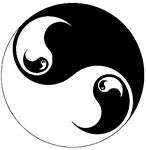Warren Kinston
18. April 2012 10:00

Frameworks for change will be posted when the cows come home. Short of a miracle or the long arm of reality change striking, it's going to take years. Changing my reality here is no joke.
As I noted in an earlier despairing blog, should I even start from here? Is the name, Change, suitable to refer to the 3rd Level in the Root Hierarchy (RL3)?
I'm pretty sure that the heart of Change, its Level 4, is stability or stabilizing. Can something that is stable be a form of change? Probably. If I called this Level Identity, then stabilizing would seem spot on. The heart of any identity is surely a stable state.
If I am asked to consult or advise regarding change, my first question is:More...
About
Warren Kinston
Warren Kinston
14. April 2012 09:00

No doctrine can deliver virtue or character. So none can ensure that using power to apply the supposedly beneficial doctrine will be safe and wise.
Character flows from our humanity, the same source as the power that we use. It is wonderful that this humanity and this power is irrepressible.
However, our humanity is a tricky thing and using power is even trickier. We are not dealing with good that is unproblematic. Humanity is built on an endless conflict between one good and something else that is also good. Of all these conflicts in relation to using power, and there are many, perhaps the most significant is that between what is good for our humanity and what is good for our society.
As you know: evil is choice of the lesser good, and of these two, More...
About
Warren Kinston
Warren Kinston
8. April 2012 11:00

«Egoism and altruism» is a hardy perennial of philosophers and now a staple for academic psychologists. Are people basically self-interested or basically concerned for others?
Trick question. Once the issue is posed like this, any hope of understanding oneself or acting sensibly is lost.
People act in their own self-interest. They must. Some are certainly more self-centred than others. People are also capable of concern for others and demonstrate benevolence. They must. Otherwise it would be hard to live in groups. Again, there is variation amongst people in the degree of altruism. For some of you, it might be hard to live with yourself if you were irredeemably selfish.
The issue is never what academics or philosophers assert people 'are'—and which, supposedly, is what you are or what I am. The issue in real life is always about what am I going to do at this moment in this situation given who I am. The variations here are almost infinite.
Yes, we do have tendencies and styles. But we are not More...
About
Warren Kinston
Warren Kinston
5. April 2012 08:00

There is a saying: They beat you and they beat you and they don't even let you cry. But why do they beat you? One reason might be to get you to see the truth. Picking up the truth of life is referred to as «the school of hard knocks».
You know that our psyche is assimilated to our body … so all psychological qualities are actually physical qualities. A person is hard, warm, brittle, bouncy, deep, &c. In a similar way, psychologically, a truth that affects your self-esteem is experienced as a blow.
This little story is by way of an introduction and an admission that, unlike many, I am not a perfect person. When I described my experience of reviewing my wonderful insights as shock-horror! in that recent blog, I was not 100% honest. More...
About
Warren Kinston
Warren Kinston
31. March 2012 18:00

I mentioned, in a recent blog, the need to formulate the dimensions of our existence. I want to pursue this mystery about 'being human' now.
The existence of two realities is weighing on me every day in every way. Do you remember C.P. Snow's famous Two Cultures lecture (and later book)? That Science v Humanities debate came and went because it was targeted at UK society of 1959: over half a century ago. In any case, the sciences are now doing fine, in the UK and everywhere. The PR machine has been cranked up and is doing a fantastic job.
However, there is now a conflict as to which reality is to be scientifically investigated. It's fundamental to understanding being human, and it is emerging as a battle for pre-eminence. I call the two realities: Psychosocial Reality and Empirical Reality. The one you bring into being by your choices, and you have the power to alter. The other exists independently of your choices and you only have More...
About
Warren Kinston